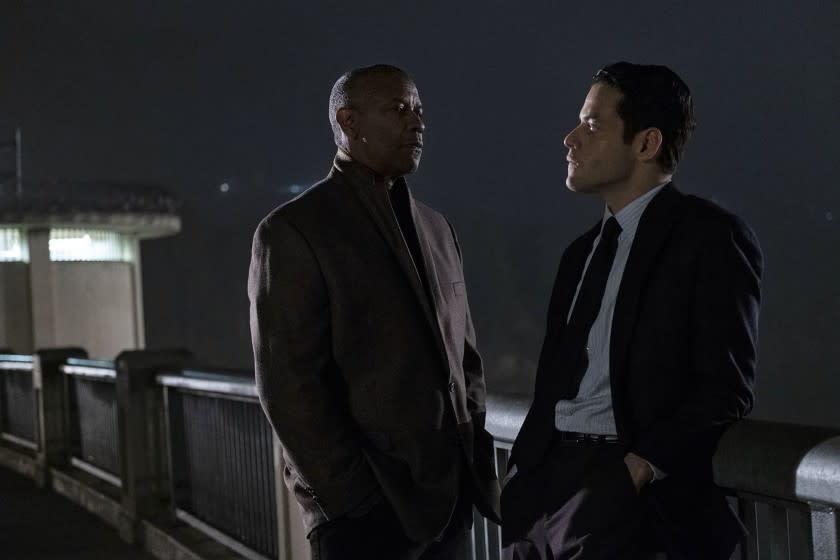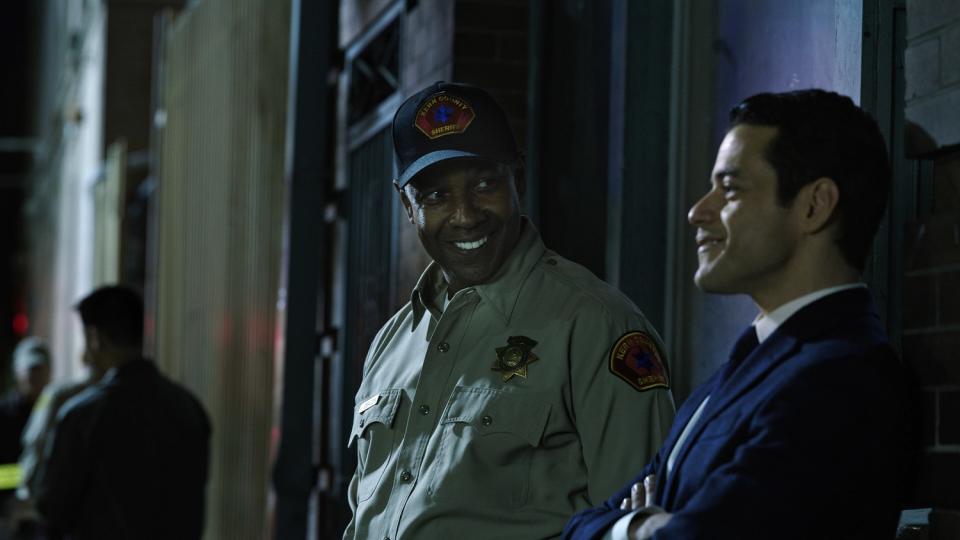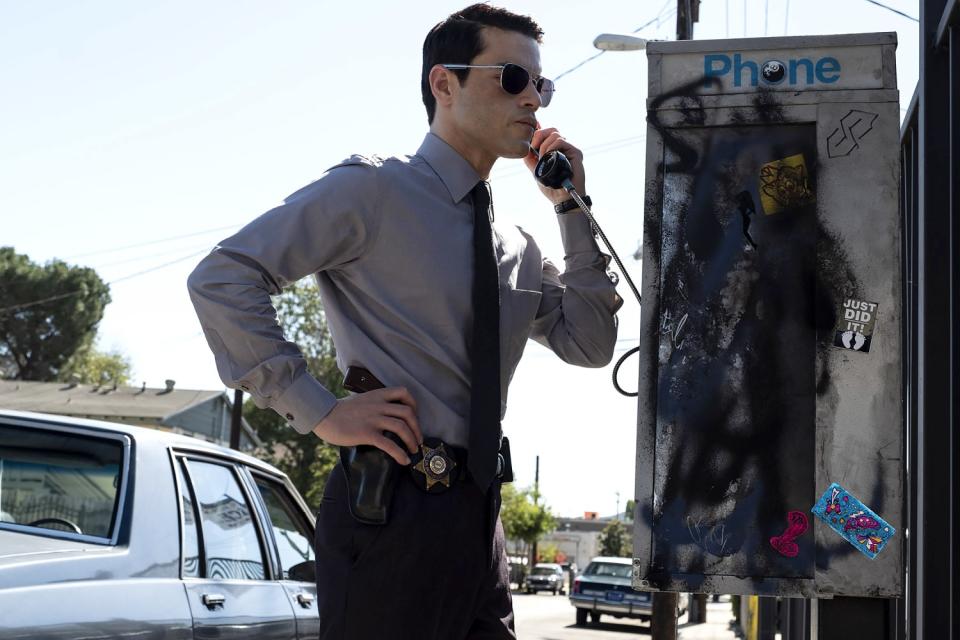Denzel Washington and Rami Malek on the challenge of releasing a movie during the pandemic

- Oops!Something went wrong.Please try again later.
- Oops!Something went wrong.Please try again later.
- Oops!Something went wrong.Please try again later.
When writer-director John Lee Hancock was looking for two actors to play detectives on the trail of a serial killer in his latest film "The Little Things," Denzel Washington and Rami Malek didn't seem like the most obvious pairing. But that was precisely what appealed to him.
"It doesn’t come out as the most logical, like, ‘Oh yeah, they fit together like hand in glove,'" says Hancock, whose previous films include "The Blind Side," "The Founder" and "The Highwaymen." "That's why I liked it. I kept thinking, 'These two guys sitting in a car together, watching an apartment — this better be interesting on its face or it could die a horrible death.'"
In Hancock's gritty psychological thriller, which will be released simultaneously on Friday in theaters and via streaming on HBO Max, veteran cop Joe Deacon (Washington), who is haunted by a tragic case in his past, becomes enmeshed alongside hard-charging detective Jim Baxter in the search for a killer who is targeting women in Los Angeles. Rounding out the trio of Oscar-winning leads Jared Leto co-stars as the creepily inscrutable prime suspect, Albert Sparma.
"Little by little, they start to share this obsession," says Hancock of the two detectives. "In some ways, it’s almost an infection that is passed from Joe Deacon to Jim Baxter, and Jim becomes complicit in things that a week ago he wouldn’t have."
"The Little Things" has taken an unusually long and circuitous path to its release. Originally written by Hancock in the early 1990s (which is when the story takes place), the project almost came to fruition several times , with Clint Eastwood, Warren Beatty and Danny DeVito each flirting with directing it. Finally brought to life three decades later with Hancock at the helm, the coronavirus pandemic upended the original theatrical release and the film is now the first test case under Warner Bros.' industry-shaking plan to put out its 2021 slate simultaneously in theaters and on HBO Max.
As this year's topsy-turvy awards season begins to take shape, Washington, 66, finds himself once again in the mix for producing the recent Netflix adaptation of August Wilson's play "Ma Rainey's Black Bottom," while Malek, 39, is making his first big-screen appearance since winning the lead actor Oscar for his turn as Freddie Mercury in 2018's "Bohemian Rhapsody." The Times spoke with the two actors about their mutual admiration, the dark side of obsession and the uncertain future of the movie business.
Denzel, you’ve played quite a few cops over the years and won an Academy Award for playing a corrupt narcotics officer in "Training Day." What was it about this script that convinced you that you could do something new with a familiar genre?
Washington: I just thought it was a good read, you know? It’s as simple as that. You read something and a lot of times you know by page two if you can’t turn to page three. In this case, I couldn’t wait to turn to page three. I’m like, where is this going? What is this? It piqued my interest right from the start.
Not to embarrass you, Denzel, but Rami, when you were growing up, were there any performances of Denzel's that made an especially big impression on you?
Washington: [deadpan] Not to embarrass me, but you are going to embarrass me. “Rami, remember when you were 3… ”?
Malek: I remember watching "Malcolm X" with my dad, sitting in the living room just being absolutely shook and mesmerized. I’ll never forget it. It was an indelible experience: the subject matter, of course, but the unique actor that I saw bringing that character to life just never escaped me. I got to see it recently in London at the [British Film Institute] and I just relished that opportunity to go back to that film and your performance. It was a true gift to work with you, man.

Washington: Thank you, brother. It's fascinating being the old guy now. A portion of this film takes place in a police interrogation room. I was sitting behind this glass, watching Rami and Jared go at it every day. It was like I needed some popcorn and Coca-Cola because it was like watching two young fighters. I was like, 'Man, I can’t wait until I get in there.' Actors like Rami and Jared and even my son [John David Washington] — this generation of brilliant young actors that is coming up, it's just fascinating watching them work and for me, it’s inspiring.
Malek: Look, man, we all come from this understanding that we’re all working toward getting anywhere close to what you’ve done. When you talk about us, it all stems from the work you’ve done.
Both of your characters become so obsessed with catching killers that they end up losing themselves. In preparing for the film, was there anything that helped you better understand that mindset?
Malek: I think we both started to dive into the psychology of these detectives who become obsessed with finding their suspect and how what may seem to be this selfless act can end up being a bit self-serving. I just found it to be such a complex tightrope for these guys, balancing what part of this is for the detective and what part is for a more altruistic cause. There’s this place where personal conviction takes over public service, and these characters are constantly butting up against both sides. You’re faced with certain things you may not want to see but these guys have to put themselves in that place to get through their day.
Washington: I once worked on another film years ago and I went out with a detective just to get a sense of how it goes. We went out on a call of a man that was in front of his house on the porch with a shotgun. We pulled up and the detective told me 'sit tight' — needless to say, I was going to sit tight — and he got out to deal with it.
As he got out, another car came screeching up and two people got out, yelling and screaming. I’m watching this situation unfold. As it turned out, these were the grandchildren of the guy with the shotgun. The detective had no idea who they were, what potential danger was going to come from this guy, and he defused the whole thing. He didn’t pull out his gun. He could have. He could have fired. The guy could have fired at him. It could have been a disaster in the wrong hands. I was like, 'Man, this is life-and-death from moment to moment. This is real bravery.'
I was shook. But that’s the reality of what they have to deal with every day. And what does that do to you? I’ll tell you what it did to me: It made me respect what they do and want to celebrate that. Because of the work they do, we have the freedom to complain.

Denzel, this is the kind of mid-range adult-oriented studio movie that has always been the bread and butter of your career but has become increasingly rare. As that kind of material has moved to TV and streaming, has it gotten any harder to find film projects that engage you?
Washington: I don’t think it’s rare — it’s just shifted where it gets made. There’s a shortage of good material right now and with streaming and everything else, content is king. So if you have good material, it’s probably easier to get it made now than it was under the old system where each studio was only going to make eight or 10 films a year. I think with streaming, it’s actually made it a little easier for a film like this to get made for a theatrical release.
There’s an old saying, “If it ain’t on the page, it ain’t on the stage.” I think that’s still the case. It starts with the material, not with the platform that it’s going to be seen on. I mean, if I’m asked to do "Othello" for whatever streaming service, then it’s something I’ll think about because it’s Shakespeare.
I don’t know if that’s a real thing but that would be amazing.
Washington: [laughs] Well, we’ve got Macbeth in the can. [Washington is set to star opposite Frances MacDormand in "The Tragedy of Macbeth," directed by Joel Coen.] One at a time.
When Warner Bros. announced it was moving its entire 2021 theatrical slate to day-and-date release on HBO Max, starting with "The Little Things," it sent shockwaves through the industry. What was your initial reaction when you heard that news?
Washington: Well, we’ll see what happens. This is a one-off. This is a unique set of circumstances. There’s never been a pandemic like this. So what’s going to happen two years from now, we’ll see. This is a unique year and everybody is having to make decisions on the fly.
Malek: Of course, I would have loved to have seen this on the big screen. Unfortunately, we don’t live in a world where that’s a possibility right now without putting people in harm’s way so you just have to factor that into everything.
Rami, you're the villain in the next James Bond movie, "No Time to Die," which is coming out in October after being delayed for more than a year. Denzel, you're currently directing your next film, "Journal for Jordan." Are you both confident that moviegoing will eventually return to some semblance of normal? Or do you worry the pandemic could permanently pull audiences away from theaters?
Malek: I do look forward to the day when we’re all back in movie theaters because that’s something that I think so many of us are in dire need of and nostalgic for, that experience that's part of our fabric.
Washington: No matter what the circumstances are, there are always going to be naysayers and worriers and this and that. I don’t live my life that way. I don’t live my life in fear of what might happen. I live my life in a faithful way.
I have a feeling it’s going to be just the opposite. I think people are going to be eager to get together again, to have communal experiences and laugh and cry and cheer together when it’s safe. I don’t think that’s going away. Everybody you talk to now can’t wait to go outside. The question is when you can go back outside, what will you do? It’s our job as actors, as filmmakers, to make the best films we can and present good options for when we do go back outside.
This interview has been condensed and edited.
This story originally appeared in Los Angeles Times.

